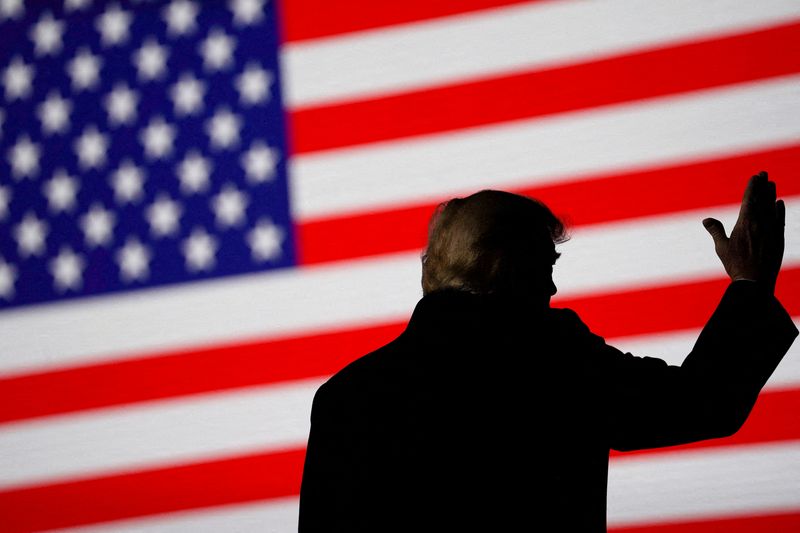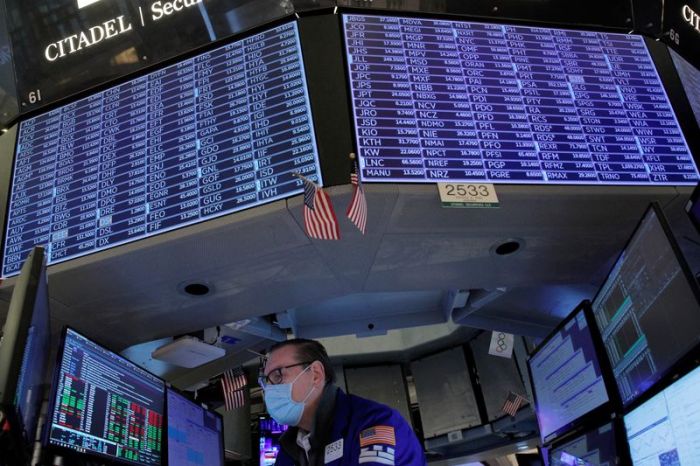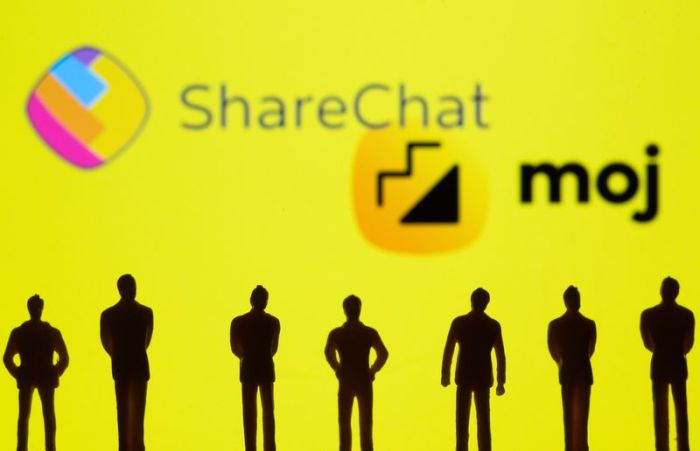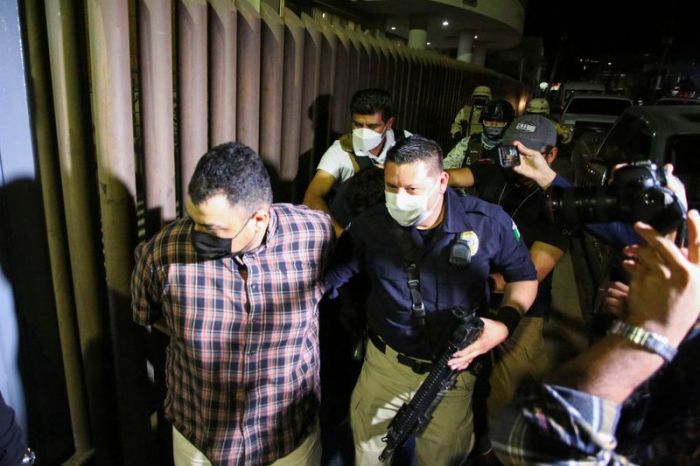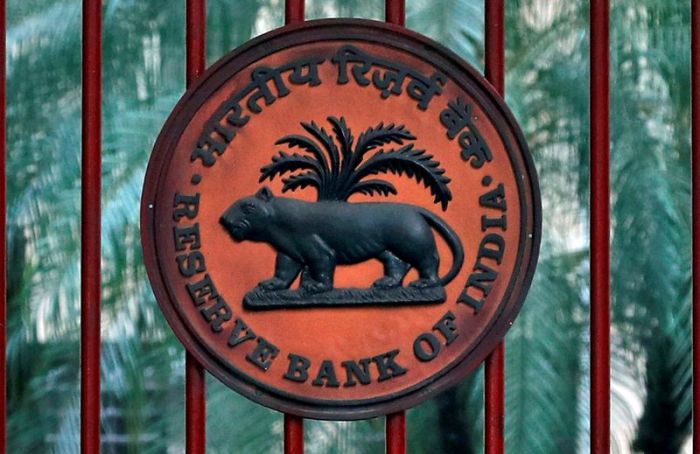(Reuters) – A China-based financier, once reprimanded by U.S. regulators and barred from taking his company public, played a bigger role than is publicly known in the shell company that agreed to merge with former President Donald Trump’s new social media venture, Reuters has learned.
Little has been disclosed about the involvement of the financier, Abraham Cinta, and the Shanghai-based investment bank he leads, ARC Group Ltd, in the shell company’s regulatory filings. ARC is listed as “financial advisor” to Digital World Acquisition Corp, the special purpose acquisition company (SPAC) that signed a deal in October to merge with Trump’s new media platform. No details are provided in the filings other than that ARC could help the SPAC with contacts in government and the business world, as well as access to a “quality deal pipeline.”
Now, new information – text messages, a financial document outlining proposed terms of the shell company, an agreement between ARC and one of Digital World’s creators, and interviews with five sources familiar with the situation – shows that Cinta and ARC did not just advise Digital World. They also offered money to create Digital World and recruited an executive to help put the company together.
ARC offered to provide at least $2 million to three businessmen to form Digital World, the SPAC that went on to merge with Trump Media and Technology Group, and Cinta had a say in how the SPAC’s management team would be compensated, according to the financial document and text messages between Cinta and others involved.
A person familiar with the matter said ARC eventually made an investment in the SPAC that became Digital World. Reuters could not confirm whether the investment was for $2 million, as ARC originally discussed. The initial investors in the management entity, or sponsor, of Digital World put in a total of $11.8 million, disclosures show.
The Washington Post and Bloomberg News previously reported that ARC has a stake in the sponsor of Digital World. The fact that ARC offered money to get the SPAC off the ground is reported here for the first time.
Cinta and spokespeople for ARC and Digital World did not respond to requests for comment.
Reuters could not establish whether Trump had any role in creating or shaping Digital World or how much Trump knew about Digital World’s backers when his company signed the deal with the SPAC. Trump Media & Technology Group spokespeople and a Trump spokesperson did not respond to requests for comment.
ARC’s deep role in the deal is atypical for a financial advisor, which is the term used to describe ARC in Digital World’s regulatory filings. An advisor usually counsels a SPAC on how to put a deal together, but doesn’t ordinarily seed the SPAC with capital or get involved in determining its senior ranks. There are no U.S. rules against such arrangements and no requirements for disclosing them, however, according to two capital markets lawyers and two finance professors interviewed by Reuters.
The details about ARC’s role shed new light on the financial firm behind the former president’s lucrative Digital World deal. ARC has carved out a specialty in funneling overseas money into Wall Street’s boom in SPACs. SPACs are listed shell companies that raise cash to acquire and take public a private company, allowing targets to sidestep the stricter regulatory checks of an initial public offering. The gold rush has been fueled by many mom-and-pop investors placing risky bets that often turned sour.
Digital World’s activities are coming under regulatory scrutiny. The Securities and Exchange Commission and the U.S. Financial Industry Regulatory Authority have made inquiries to Digital World about the circumstances around the deal, according to a regulatory filing. The SEC is looking into Digital World’s policies and procedures relating to trading, as well as the “identities of certain investors” in the SPAC and where the money came from. FINRA has asked for details about “surrounding events,” including a review of trading that preceded the announcement of the SPAC’s merger with Trump’s company, Digital World has disclosed.
The SEC and FINRA have not taken any action, and the agencies declined to comment on their inquiries.
Many questions remain unanswered about the deal, including the origin of the bulk of the $11.8 million in funds used to set up Digital World. That stake would now be worth $705 million, according to Reuters calculations based on regulatory filings.
The $2 million that ARC proposed ponying up was to come through a Singapore-based fund that Cinta’s firm managed, according to the financial document with the proposed terms seen by Reuters.
Besides the money ARC would invest with its Singapore fund, two investors from Israel, blockchain entrepreneurs Stas Oskin and Sebastian Stupurac, would put in an additional $350,000, according to the document, whose digital signature lists Cinta as its creator.
Stupurac confirmed his participation in a text message to Reuters and said he recalled a different investment figure. He declined to disclose what his investment was and said that “all information should be public at some point”. He added he agreed “to sponsor the idea” because he believed in the SPAC’s management team, but did not get involved in its unfolding and did not follow subsequent events. He declined to provide more details.
Oskin did not respond to requests for comment.
As part of the deal, ARC would have veto power over any deal the blank-check firm pursued, the document shows. Reuters could not establish the identity of the investors in the ARC Singapore fund that offered to invest in Digital World, or whether ARC secured veto power.
Securities regulations do not require Digital World to disclose the investors behind its sponsor. Digital World lists the sponsor in regulatory filings as a Delaware-listed company called ARC Global Investments II. The filings don’t say whether that entity is affiliated with China-based ARC. The papers list Digital World chief executive Patrick Orlando as the “managing member” of ARC Global Investments II.
Orlando did not respond to requests for comment.
Digital World’s merger with Trump Media has been immensely lucrative for shareholders thus far. Trump has yet to launch his social media product, and industry analysts have questioned whether it can take on established platforms such as Facebook.
Investors have snapped up shares in Digital World nonetheless, making it the best-performing SPAC of all time. Trump’s company, worth $875 million when the deal was inked in October, is now valued at up to $10.6 billion.
Other U.S. SPACs that ARC has worked on have underperformed peers. The average share price of 18 ARC-affiliated SPACs, excluding Digital World, stands at $9.45, below their $10 initial public offering price and the SPAC industry average of $9.88.
“THE DEAL HAS CHANGED”
Cinta’s early forays into public markets struggled. A former official at Mexico’s Ministry of Welfare, Cinta and several ARC colleagues were reprimanded by the SEC in 2017 for misrepresenting businesses they tried to take public and making false statements about their affiliation with them. In a rare move, the SEC stopped them from taking those companies public at the time.
Cinta and the SEC didn’t respond to requests for comment for a Reuters report on the matter last October.
The financiers soon repositioned themselves as investment bankers in China and turned to SPACs as a new way to take companies public, a review of their deals shows.
In creating SPACs to list in the United States, ARC often looks for American executives to become managers, and raises money from investors in China and other foreign countries to provide the initial capital needed to launch them, according to regulatory filings and five people familiar with the matter.
In a 2020 marketing presentation that has since been removed from its website, ARC stated it “was able to craft a Wuhan-based SPAC sponsored by a family office, structured by ARC in Singapore, to allow our client to enjoy the flexibility and benefits of the U.S. financial markets.”
The SPAC, Yunhong International, led by Orlando and backed financially by Chinese businessman Yubao Li, liquidated last year, citing its “inability to consummate an initial business,” according to regulatory filings.
Li did not respond to requests for comment.
ARC became involved in Digital World when a Singapore-based ARC executive introduced Cinta to Daniel Santos, a blockchain consultant and entrepreneur in the city-state in 2020, a source familiar with the matter said.
Santos signed a deal with ARC in September 2020 to connect ARC with executives who can form SPACs, according to a copy of the agreement seen by Reuters. In a hypothetical example of a $50 million SPAC, Santos would get up to $97,500 in fees plus 20% of the shares in the SPAC that ARC would receive, the agreement states.
Santos was discussing launching a SPAC with two executives in the U.S. video gaming industry, Lee Jacobson and Brian Fargo, according to the document, text messages and people familiar with the matter. Jacobson and Fargo sought capital – $556,090, according to a regulatory filing – to launch the SPAC.
It was eventually decided that Jacobson, the head of a San Diego-based gaming company called Robot Cache, would be CEO of Digital World, while Santos and Fargo would be board directors, according to the document and a regulatory filing. In return, the three executives would get thousands of shares in the SPAC, the text messages and the financial document show.
Jacobson and Fargo didn’t respond to requests for comment.
In July 2021, Cinta told Santos that Santos would no longer be part of Digital World. “The deal has changed… new owner, new board and management, but I’ll make sure we get shares for you,” Cinta told Santos in one of the messages seen by Reuters.
Jacobson informed Santos that Jacobson’s role had changed from Digital World CEO to board director. Orlando, a Miami businessman whom ARC had worked with on another SPAC, succeeded Jacobson as CEO of Digital World.
“Somebody else runs it now. We shall see how it all shakes out as I am still on the board,” Jacobson said in one of the text messages. Santos never received any Digital World shares or compensation for putting the SPAC together, one of the sources said.
Orlando did not respond to requests for comment. Reuters could not learn what led to the changes in the management team and what role ARC played in them.
(Additional reporting by Krystal Hu in New York, Chris Prentice in Washington D.C. and Anirban Sen in Bangalore; Editing by Greg Roumeliotis and Edward Tobin)

